|
|
St Sylvester, Bishop of Rome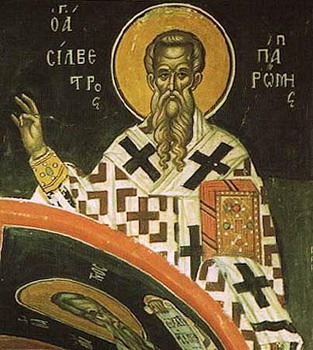 Born in Rome, he was skilled from his early years in secular learning and in Christian doctrine, and his life was always governed by the precepts of the Gospel. He made good use of the tuition of a priest, Timothy, whose death for the Faith he witnessed, and, seeing the example of his teacher's self-sacrifice, nourished himself in that same spirit for the rest of his life.
He became Bishop of Rome at the age of thirty, and reformed certain Christian customs; abolishing, for example, the Saturday fast that had up to that time been the rule among some Christians, and decreeing that only Great Saturday and those Saturdays that fall within fasting seasons should be so observed.
By his prayers and miracles, he was instrumental in the conversion and baptism of the Emperor Constantine and his mother, Helena, and assisted Queen Helena in the finding of the Holy Cross. He governed the Church for twenty years, and, finishing with honor his earthly life, entered into the heavenly Kingdom in the year 335. Born in Rome, he was skilled from his early years in secular learning and in Christian doctrine, and his life was always governed by the precepts of the Gospel. He made good use of the tuition of a priest, Timothy, whose death for the Faith he witnessed, and, seeing the example of his teacher's self-sacrifice, nourished himself in that same spirit for the rest of his life.
He became Bishop of Rome at the age of thirty, and reformed certain Christian customs; abolishing, for example, the Saturday fast that had up to that time been the rule among some Christians, and decreeing that only Great Saturday and those Saturdays that fall within fasting seasons should be so observed.
By his prayers and miracles, he was instrumental in the conversion and baptism of the Emperor Constantine and his mother, Helena, and assisted Queen Helena in the finding of the Holy Cross. He governed the Church for twenty years, and, finishing with honor his earthly life, entered into the heavenly Kingdom in the year 335.Our Holy Father Seraphim of Sarov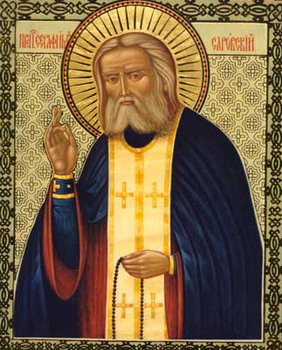 He was one of the greatest Russian ascetics and wonderworkers, with profound spiritual discernment. Born in 1759, he departed this life in 1833. He was distinguished by a great humility. When being praised by all the world, he referred to himself as "the poor wretch Seraphim". He was one of the greatest Russian ascetics and wonderworkers, with profound spiritual discernment. Born in 1759, he departed this life in 1833. He was distinguished by a great humility. When being praised by all the world, he referred to himself as "the poor wretch Seraphim".St Theodota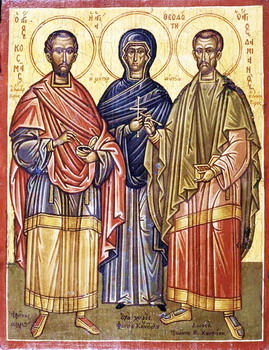 The mother of the holy brothers Cosmas and Damian, the Unmercenaries and Wonderworkers. She lived a life pleasing to God, and brought up her sons to do the same. The mother of the holy brothers Cosmas and Damian, the Unmercenaries and Wonderworkers. She lived a life pleasing to God, and brought up her sons to do the same.Our Holy Father Ammon of TabennisiHe was a great ascetic of the fifth century and had charge of the Tabennisiot monastery in Upper Egypt, about 3,000 monks living in asceticism under his direction. He had the blessed gifts of wonderworking and spiritual discernment. When one of his monks asked him for counsel, he said to him in reply: `Be as a transgressor in prison and ask repeatedly, as he would: "When will the Judge appear?" So thou also, ask thou this with fear."
Hieromartyr Theogenes, bishop of Parium on the Hellespont The PriestMartyr Theogenes was bishop of the Asia Minor city of Pareia at the beginning of the IV Century. During the reign of the emperor Licinius (307-324), – a co‑ruler of Constantine the Great, the tribune Zalicentius demanded him to forsake the priestly dignity, to renounce Christ and to enlist in military service. After his resolute refusal, Saint Theogenes was mercilessly beaten with canes and thrown into prison, where it was forbidden to allow him food. They then sentenced him to be drowned in the sea. Before execution the saint requested time for prayer, during which time an extraordinary light shone on him. The sailors and certain of the soldiers entrusted to drown the saint were struck by the light and were converted to Christ, but other soldiers hastened to cast the saint into the sea. Saint Theogenes accepted a martyr's death in about the year 320. His body was afterwards taken from the waters by Christians and buried at the city walls. And at this spot numerous healings occurred. The PriestMartyr Theogenes was bishop of the Asia Minor city of Pareia at the beginning of the IV Century. During the reign of the emperor Licinius (307-324), – a co‑ruler of Constantine the Great, the tribune Zalicentius demanded him to forsake the priestly dignity, to renounce Christ and to enlist in military service. After his resolute refusal, Saint Theogenes was mercilessly beaten with canes and thrown into prison, where it was forbidden to allow him food. They then sentenced him to be drowned in the sea. Before execution the saint requested time for prayer, during which time an extraordinary light shone on him. The sailors and certain of the soldiers entrusted to drown the saint were struck by the light and were converted to Christ, but other soldiers hastened to cast the saint into the sea. Saint Theogenes accepted a martyr's death in about the year 320. His body was afterwards taken from the waters by Christians and buried at the city walls. And at this spot numerous healings occurred.New Martyr George (Zorzes) the Georgian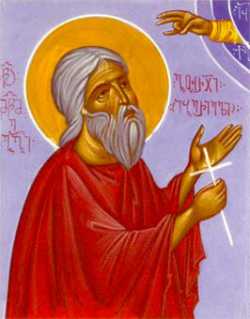 A native of Georgia, he was sold as a slave to a Turk and made a Muslim in his youth. He lived a long life as a Muslim, seemingly having no memory of the faith or language of his parents. Without warning, however, when he had reached the age of seventy, his conscience awakened, he presented himself to the judge and stated that he had been born a Christian and wished to die a Christian. The old man remained immovable under questioning, exhortation, threats and, finally, torture; he would only say 'I am a Christian; I want to die a Christian!' The executioners hanged him, then cut him down to see if this last trial would change his mind. When he assured them once again that he was a Christian, they hanged him again, and he was allowed to claim his martyrdom. A native of Georgia, he was sold as a slave to a Turk and made a Muslim in his youth. He lived a long life as a Muslim, seemingly having no memory of the faith or language of his parents. Without warning, however, when he had reached the age of seventy, his conscience awakened, he presented himself to the judge and stated that he had been born a Christian and wished to die a Christian. The old man remained immovable under questioning, exhortation, threats and, finally, torture; he would only say 'I am a Christian; I want to die a Christian!' The executioners hanged him, then cut him down to see if this last trial would change his mind. When he assured them once again that he was a Christian, they hanged him again, and he was allowed to claim his martyrdom.Venerable Theopemptos
Venerable Mark the DeafSt. Cosmas, archbishop of Constantinople
Martyrs Theopistos
Martyr Sergius of Caesarea in Cappadocia
Righteous Juliana of Lazarevo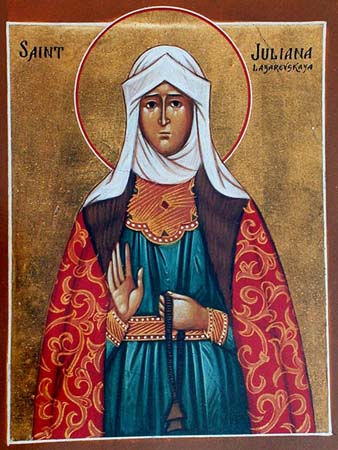 Righteous Juliania of Lazarev and Muromsk presents an astonishing example of a self-denying Russian Christian woman. She was the daughter of the nobleman Iustin Nediurov. From her early years she lived piously, kept the fasts strictly and set aside much time for prayer. Early on having become orphaned, she was given over into the care of kinsfolk, who did not take to her and laughed at her. Juliania bore everything with patience and without complaint. Her love for people expressed itself in this manner – she often nursed the sick and sewed clothing for the poor. The pious and virtuous life of the maiden attracted the attention of the Lazarev village owner, Yurii Osor'in, who thereafter soon married her. The husband's parents loved their gentle daughter-in-law and gave over into her hands the running of the household. Domestic concerns did not disrupt the spiritual efforts of Juliania. She always found time for prayer and she was always prepared to feed the orphaned and clothe the poor. During the time of an harsh famine, she herself remained without food, having given away her last morsel to someone begging. When an epidemic started after the famine, Juliania devoted herself completely to the nursing of the sick.
Righteous Juliania had six sons and a daughter. After the death of two of her sons she decided to withdraw to a monastery, but her husband persuaded her to remain in the world, and to continue to raise their children. On the testimony of a son of Juliania – Kallistrat Osor'in, who wrote her life, at this time she became all the more demanding towards herself: she intensified her fasting and prayer, slept not more than two hours at night, and then laying her head upon a board.
Upon the death of her husband, Juliania distributed to the poor her portion of the inheritance. Living in extreme poverty, she was none the less for it vivacious, cordial, and in everything she thanked the Lord. The saint was vouchsafed a visitation by Saint Nicholas the Wonderworker and guidance by the Mother of God in church. When Righteous Juliania expired to the Lord, she was then buried alongside her husband at the church of Saint Lazarus. Here also was buried her daughter, the schema-nun Theodosia. In the year 1614 the relics of Righteous Juliania were uncovered, exuding a fragrant myrh, from which many received healing. Righteous Juliania of Lazarev and Muromsk presents an astonishing example of a self-denying Russian Christian woman. She was the daughter of the nobleman Iustin Nediurov. From her early years she lived piously, kept the fasts strictly and set aside much time for prayer. Early on having become orphaned, she was given over into the care of kinsfolk, who did not take to her and laughed at her. Juliania bore everything with patience and without complaint. Her love for people expressed itself in this manner – she often nursed the sick and sewed clothing for the poor. The pious and virtuous life of the maiden attracted the attention of the Lazarev village owner, Yurii Osor'in, who thereafter soon married her. The husband's parents loved their gentle daughter-in-law and gave over into her hands the running of the household. Domestic concerns did not disrupt the spiritual efforts of Juliania. She always found time for prayer and she was always prepared to feed the orphaned and clothe the poor. During the time of an harsh famine, she herself remained without food, having given away her last morsel to someone begging. When an epidemic started after the famine, Juliania devoted herself completely to the nursing of the sick.
Righteous Juliania had six sons and a daughter. After the death of two of her sons she decided to withdraw to a monastery, but her husband persuaded her to remain in the world, and to continue to raise their children. On the testimony of a son of Juliania – Kallistrat Osor'in, who wrote her life, at this time she became all the more demanding towards herself: she intensified her fasting and prayer, slept not more than two hours at night, and then laying her head upon a board.
Upon the death of her husband, Juliania distributed to the poor her portion of the inheritance. Living in extreme poverty, she was none the less for it vivacious, cordial, and in everything she thanked the Lord. The saint was vouchsafed a visitation by Saint Nicholas the Wonderworker and guidance by the Mother of God in church. When Righteous Juliania expired to the Lord, she was then buried alongside her husband at the church of Saint Lazarus. Here also was buried her daughter, the schema-nun Theodosia. In the year 1614 the relics of Righteous Juliania were uncovered, exuding a fragrant myrh, from which many received healing.Venerable Sylvester of the Kiev Caves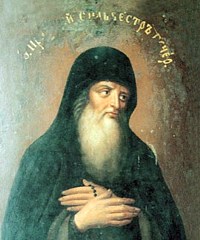 The Monk Sylvester of Pechersk lived during the XII Century and was hegumen of the Mikhailovsk Vydubitsk monastery at Kiev. He continued the work of the Monk‑Chronicler Nestor and he wrote nine Vitae of the Pechersk holy saints. In the service to the Pechersk Fathers venerated in the Nearer Caves, the Monk Sylvester is called blessed and endowed with "a miraculous gift to ward off demonic suggestions (Ode 9 of the Canon). The Monk Sylvester was buried in the Nearer Caves, and his memory is celebrated likewise on 28 September and on the 2nd Sunday of Great Lent. The Monk Sylvester of Pechersk lived during the XII Century and was hegumen of the Mikhailovsk Vydubitsk monastery at Kiev. He continued the work of the Monk‑Chronicler Nestor and he wrote nine Vitae of the Pechersk holy saints. In the service to the Pechersk Fathers venerated in the Nearer Caves, the Monk Sylvester is called blessed and endowed with "a miraculous gift to ward off demonic suggestions (Ode 9 of the Canon). The Monk Sylvester was buried in the Nearer Caves, and his memory is celebrated likewise on 28 September and on the 2nd Sunday of Great Lent. |